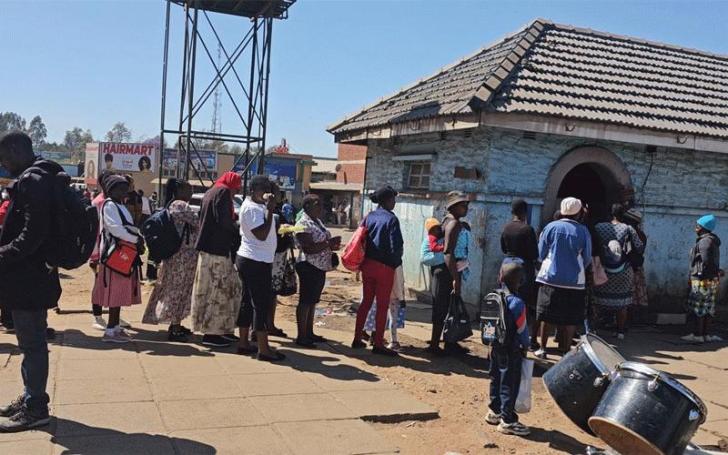News / National
Controversy erupts over Harare's public toilet fees
28 Sep 2024 at 11:13hrs |
0 Views

The City of Harare (CoH) is facing backlash after introducing fees ranging from 50 cents to one US dollar for residents wishing to use public toilets. This decision has sparked outrage, prompting Zimbabwe Lawyers for Human Rights (ZLHR) to take action against what they term a violation of residents' rights.
Roselyn Hanzi, the director of ZLHR, through her lawyer Tinashe Chinopfukutwa, has issued a letter of demand to the city council, calling for an immediate halt to what they describe as corrupt practices surrounding public restroom access. Hanzi emphasized that the treatment of ratepayers is both degrading and undignified.
Reports indicate that users of the public toilets are required to provide their own toilet paper; those without it must pay a "tissue fee" of US $0.50. Furthermore, individuals who cannot afford this fee or do not possess the required tissue are reportedly turned away. The situation has raised concerns about privacy violations, as "toilet inspectors" reportedly invade personal spaces, subjecting users to inhumane and degrading treatment.
In the letter dated September 25, Chinopfukutwa noted that Hanzi, who frequents the Central Business District (CBD) for business and leisure, has been alarmed by media reports detailing the unsanitary conditions of the public toilets. He highlighted specific locations, including the Market Square bus terminus, Copa Cabana bus terminus, Charge Office bus terminus, and 4th Street bus terminus, where the public toilets are allegedly poorly maintained and often blocked with overflowing sewage.
Hanzi's demands extend beyond the cessation of the fees. She is urging the City of Harare to repair and maintain the dilapidated toilet facilities. Failure to address these issues could lead her to pursue legal action against the council.
According to Hanzi, the conditions of the public toilets pose significant health risks, potentially exposing residents to diseases like cholera and typhoid. She argues that this situation infringes upon the right to a healthy environment, as guaranteed in section 73(1)(a) of the Constitution. Furthermore, she contends that the CoH has failed in its legal obligations under the Urban Councils Act to provide functional public toilets within its jurisdiction, despite collecting rates for sewer services from residents.
Hanzi criticized the City of Harare for neglecting its responsibility to maintain public amenities and for compromising residents' rights. As the situation unfolds, citizens and advocacy groups are closely watching to see how the city will respond to these allegations and whether significant reforms will be implemented to improve public sanitation services in Harare.
Roselyn Hanzi, the director of ZLHR, through her lawyer Tinashe Chinopfukutwa, has issued a letter of demand to the city council, calling for an immediate halt to what they describe as corrupt practices surrounding public restroom access. Hanzi emphasized that the treatment of ratepayers is both degrading and undignified.
Reports indicate that users of the public toilets are required to provide their own toilet paper; those without it must pay a "tissue fee" of US $0.50. Furthermore, individuals who cannot afford this fee or do not possess the required tissue are reportedly turned away. The situation has raised concerns about privacy violations, as "toilet inspectors" reportedly invade personal spaces, subjecting users to inhumane and degrading treatment.
In the letter dated September 25, Chinopfukutwa noted that Hanzi, who frequents the Central Business District (CBD) for business and leisure, has been alarmed by media reports detailing the unsanitary conditions of the public toilets. He highlighted specific locations, including the Market Square bus terminus, Copa Cabana bus terminus, Charge Office bus terminus, and 4th Street bus terminus, where the public toilets are allegedly poorly maintained and often blocked with overflowing sewage.
Hanzi's demands extend beyond the cessation of the fees. She is urging the City of Harare to repair and maintain the dilapidated toilet facilities. Failure to address these issues could lead her to pursue legal action against the council.
According to Hanzi, the conditions of the public toilets pose significant health risks, potentially exposing residents to diseases like cholera and typhoid. She argues that this situation infringes upon the right to a healthy environment, as guaranteed in section 73(1)(a) of the Constitution. Furthermore, she contends that the CoH has failed in its legal obligations under the Urban Councils Act to provide functional public toilets within its jurisdiction, despite collecting rates for sewer services from residents.
Hanzi criticized the City of Harare for neglecting its responsibility to maintain public amenities and for compromising residents' rights. As the situation unfolds, citizens and advocacy groups are closely watching to see how the city will respond to these allegations and whether significant reforms will be implemented to improve public sanitation services in Harare.
Source - NewZimbabwe
Join the discussion
Loading comments…


































